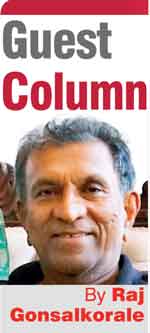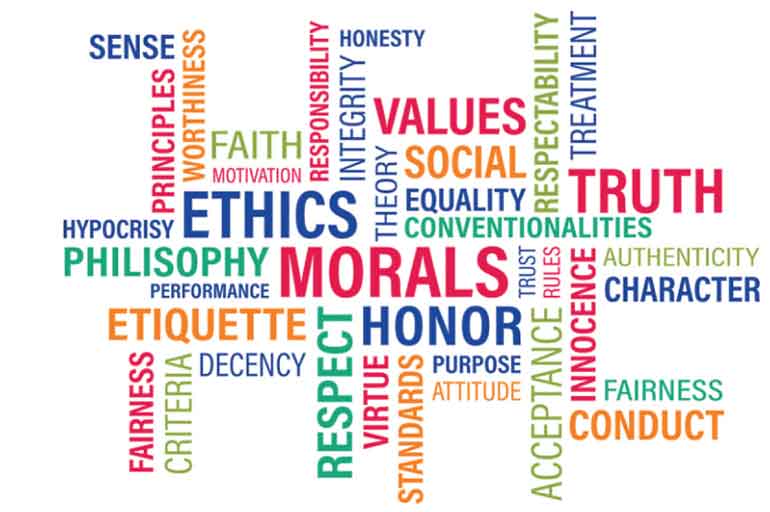Sunday Feb 15, 2026
Sunday Feb 15, 2026
Saturday, 4 January 2025 00:05 - - {{hitsCtrl.values.hits}}

A society devoid of values will always be engaged in trying to expose truths as lies and vice versa
Political leaders, religious leaders and civil society leaders should strive to live, practice and promote values and be examples to others in a society. The cause for propagating lies as truth, and truth as lies, are manifestation of a society without values. If a society has moral values, ethical behaviour, fairness, honesty, and integrity, and people live a value-based life, truth will always prevail as lying will have a very limited use in such a society
 “You have the complete right to convince any truth as a lie and any lie as a truth. That is your democratic right. You have the right to see the negative side when the government is doing something good. And also, you have the right to praise when a leader, government, institution or an individual is doing something harmful to society” – NPP Member of Parliament Nilanthi Kottahachchi
“You have the complete right to convince any truth as a lie and any lie as a truth. That is your democratic right. You have the right to see the negative side when the government is doing something good. And also, you have the right to praise when a leader, government, institution or an individual is doing something harmful to society” – NPP Member of Parliament Nilanthi Kottahachchi
Although the Member of Parliament has perhaps not full well explained the context of her statement, what she and all others should take into consideration is what a system change should mean in a society and how a system change could restore some values that have been eroded over time and how the political, religious and civil society leadership could act and be examples to others about governing within a value system that the above graphical illustration depicts with truth being one of the many values.
In a value-based society, a truth and a lie cannot conveniently fall within the ambit of a democratic right. In fact, democracy itself should fall within the ambit of a broader value system. What is a democracy if there are no moral values, if there no ethics, if there is no fairness, if there is no honesty, and if there is no integrity?
From a Buddhist perspective, the Fourth Precept: Abstain from False and Harmful Speech, gives an idea as to what a lie is. The following paragraph on the fourth of the five precepts ((https://tricycle.org/beginners/buddhism/fourth-precept/), gives a practical explanation —Buddhist guidelines for an ethical life—is to refrain from false and harmful speech, often simplified as not lying. However, the fourth precept is more than a simple directive to tell the truth. It is often viewed in the context of the foundational Buddhist practice of Right Speech, a more thorough framework, contained in the eightfold path, for how best to thoughtfully and compassionately speak and listen.

False speech includes any untrue statement as well as some factual ones. Straightforward lies clearly violate the precept but so do common behaviours like self-inflation, exaggeration, lying by omission, pretending to know something, and even some forms of humour, such as sarcasm, that may be hurtful. Gossip, true or not, is considered false speech, as is anything divisive or malicious, as well as idle chatter. The fourth precept covers all forms of communication—speaking, writing, even body language. As with the other precepts, violations are not evenly weighted. Telling a lie as part of a joke is not as serious as, say, lying to get a job or spreading harmful rumours. In Theravada Buddhism, there are four factors that lead to an infringement of the fourth precept. Intent is one, so saying something false that you believe to be true is not considered a violation. Whether or not the listener believes the falsehood is not a factor.
Not as rules to be blindly followed but as guidelines
A frequent question that arises in discussion about the fourth precept concerns lies told to prevent harm. For example, if Anne Frank were hiding in your attic and the Nazis came knocking to ask if you were harbouring her, would lying to save her violate the fourth precept? Opinions vary about whether a lie in such case would constitute an offense, as do recommendations on the right course of action. Generally, in daily life, Buddhist teachers advise against rationalising lying as beneficial in intent and encourage practitioners to handle sticky situations without falsehood. However, especially in extraordinary circumstances, it’s important to understand the precepts not as rules to be blindly followed but as guidelines for acting compassionately and cultivating a mind unperturbed by guilt.
Teresa Mercer from Youth First, Inc. in a an article titled “Upholding Values in Today’s Society”
(https://youthfirstinc.org/values -in-todays-society/#:~:text=Social%20values% 20reflect% 20how%20we,doesn’t%20practice%20many%20values), gives a succinct summary on values. It is well for the likes of MP Kottahachchi and similar thinking individuals to note this and take heed.
Quote “Values reflect our sense of right and wrong. They help us grow and develop. They help us create the future we want. The decisions we make every day are a reflection of our values. We learn most of our values from our parents and extended families. Our family values stem from our social and cultural values. Sometimes new life experiences may change values we previously held. Individual values reflect how we live our life and what we consider important for our own self-interests. Individual values include enthusiasm, creativity, humility and personal fulfillment. Relationship values reflect how we relate to other people in our life, such as friends, family, teachers, managers, etc. Relationship values include openness, trust, generosity and caring. Social values reflect how we relate to society. Social values include justice, freedom, respect, community, and responsibility.
What are we leaving behind for our future generations?
In today’s world, it may seem our society doesn’t practice many values. We have a rise in discrimination, abuse of power, greed, etc. What are we leaving behind for our future generations? Maybe it’s time society takes a hard look at its values.
Empathy – Empathy is defined as understanding and sharing the feelings of another. People need to understand who others are and accept who they are. Focusing on how we can grow together should be our ultimate goal.
Respect – Mutual respect is needed for all of us. This is what makes us human. Having respect for everyone, despite the differences between us, is vital in order for a society to function well.
Love – Having love in our hearts keeps us from feeling the need to harm others. Love helps us acknowledge the similarities we all share rather than the differences of colour, religion or sexual orientation.
Loyalty – Loyalty is a value that binds us to a person, thing or sentiment. With loyalty, we do not betray. If we all shared loyalty, it would help us build the strength needed to stand up against something that would harm our society.
Honesty – One form of honesty in society is accepting yourself. With honesty, you can admit your flaws and take the necessary steps to improve yourself. When we can admit to our flaws it can help someone else admit theirs. Ultimately, we can all help each other become better people.
Values can be contagious; if you practice them, many others will also, including our children. Hopefully more practice from all of us will leave the world a better place for future generations” unquote.
Truth and lies
The discussion on truth and lies should ideally come within the ambit of values and not within an abstract philosophical perceptive. A society devoid of values will always be engaged in trying to expose truths as lies and vice versa. From a philosophical prism one can argue about the relativity of a truth and a lie. Hundreds of years ago, the earth being flat rather than round was told as a truth by some.
Brittanica states that the perception that Earth exists as a flat disk, either circular or square-shaped persisted in the ancient world until empirical observations revealed that Earth’s shape was spherical or ellipsoidal. In modern times, however, interestingly, the notion of a flat Earth has been revived and promoted on social media despite scientific evidence to the contrary.
However, perhaps this was not a conventional lie but more an assertion based on what was known then, and also a point of view presented by people in privileged and powerful positions in society at the time. Many truths, understood to be truths at a point in time, were based on many factors including available technology, religious dogma and religious institution dictates. While some of these may have been deliberate lies, it is difficult to conclude they were.
Kottachchi’s point of view could be understood from a more philosophical perspective, and the right to question what is presented as the truth. One could argue that even Siddhartha Gautama questioned what was presented to him as the truth by some teachers, and he proceeded to mentally challenge such truths until he realised is own version of the truth relating to the truth of suffering, the truth of the cause of suffering, the truth of the end of suffering, and the truth of the path that leads to the end of suffering. Siddhartha Gautama however was not engaged in exposing a lie, as very clearly his teachers were not lying, but he was questioning in his mind what was taught to him as he was convinced it was not the truth relating to suffering, causes for it, how to end suffering and the path to end suffering.
From a political perspective, Kottachchi’s view that “You have the complete right to convince any truth as a lie and any lie as a truth” has a deep meaning if for one moment the statement is considered from a non-political angle. Political versions of truths and lies generally are tools that one group or another uses to praise or discredit another group for the sake of power. Many politicians and media personalities, make statements that something is a truth without adequate investigations or facts to base the statement as a truth. Many members of the public believe such statements as the truth depending on who has made the statement and how convincingly it has been made.
If Kottachchi’s point of view is applied to such situations, it would be perfectly in order for the public to question such statements, investigate facts, and come to a conclusion that the statement made is either a truth, or it is untruthful and even an outright lie. The same applies to statements that are publicised as lies, and if questioning, investigation shows that the statement is in fact truthful, and not a lie, then, attempting prove a truth as a lie or a lie is a truth is indeed a rational course to follow.
Such situations however should not occur and will not occur if a society acts within a framework of values as outlined earlier. Political leaders, religious leaders and civil society leaders should strive to live, practice and promote values and be examples to others in a society. The cause for propagating lies as truth, and truth as lies, are manifestation of a society without values. If a society has moral values, ethical behaviour, fairness, honesty, and integrity, and people live a value-based life, truth will always prevail as lying will have a very limited use in such a society.